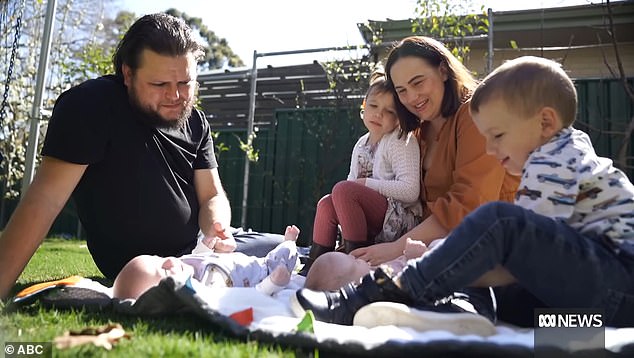Superfetation: Doctors left stunned after Perth woman falls pregnant TWICE in three weeks thanks to extremely rare phenomenon – and her healthy ‘twins’ are born nine months later
A mother became pregnant twice in 18 days, both through IVF and natural conception, leaving doctors baffled.
Sandra and David Searle, 36 and 40, started their third round of IVF treatment in August 2022 without realizing she was already pregnant.
The extremely rare phenomenon is known as ‘superfetation’ and Ms Searle is only the tenth recorded case in history; in April, little Michael and Poppy were born.
Superfetation is an extremely rare phenomenon in which two children are conceived in the same womb at different times and are ultimately born as ‘twins’.
The Perth couple had undergone IVF twice before it led to the birth of their children Georgia, aged five, and Fred, aged three.
But on the third occasion, astonished doctors found two embryos at different stages of development during the ultrasound.
Poppy and Michael (pictured) are the tenth confirmed case of superfetation in history, where two embryos are conceived separately in the same womb
Health problems had previously ruled out natural insemination and after Mrs Searle had what she thought was her period, they began their treatments at the clinic.
‘At first we didn’t understand how it could possibly have happened, especially when you’re going through IVF and it’s all very scientific, evidence-based stuff,’ says Ms Searle. told the West.
Blood tests failed to detect Poppy before the insemination process began and by the time doctors found out Mrs Searle was already pregnant with twins.
The couple were asked by doctors at the clinic if they had had sex during the trial, as they tried to figure out how a double pregnancy could have happened.
Mrs Searle assured them that she and her husband had refrained from trying it naturally while undergoing the treatment, and that this must have been done beforehand.
The natural pregnancy came as a shock to the couple, as Searle was diagnosed with testicular cancer in 2015.
Around the same time, Mrs Searle was also told she had a low egg count.
Under these circumstances, doctors warned the couple that the chances of them conceiving naturally were minimal.
Although the newborns are technically twins, they were born at different stages of development because they spent different amounts of time in the womb.
Poppy was three kilos and had already developed her sucking reflex when she was born, but Michael was only two kilos and couldn’t even roll yet.
“He’s probably a month behind developmentally,” Ms Searle said.
However, after some minor problems in the first week of his life, Mrs Searle said Michael is doing fine after five months.

This was the couple’s third successful round of IVF after Mr Searle was diagnosed with testicular cancer in 2015 and Mrs Searle discovered she had a low egg count.
Mr Searle chose to freeze his sperm before starting chemotherapy so they could have children later.
‘We were already very lucky to have had the one at first, let alone two and then three, and when we found out that we had managed to get a bit of a two-for-one deal with the third pregnancy, it was exciting, but a little scary at the same time,” Mr Searle said told Today.
Mrs Searle spent a fortnight in hospital before giving birth in the 37th week of her pregnancy.
The couple’s obstetrician aimed for a pregnancy of 39 weeks, which would have given Michael 36 and a half weeks in the womb.
Although only ten cases of superfetation have been recorded worldwide, it is believed that the phenomenon goes underreported because it is so difficult to detect.
Dr. Richard Murphy, the family’s fertility expert, only noticed the double pregnancy after noticing that Mrs Searle’s hormone levels were ‘sky high’ in her first blood test.
A scan showed a fetus that was 18 days earlier than where it should have been.
“There are probably other cases that are going unreported and that we just don’t know about,” says Dr. Murphy. told ABC.
‘It’s always interesting to document these because they are so rare that there will be a few cases in the literature, but not many. So it’s interesting for other doctors to see that these rare things can happen.”
